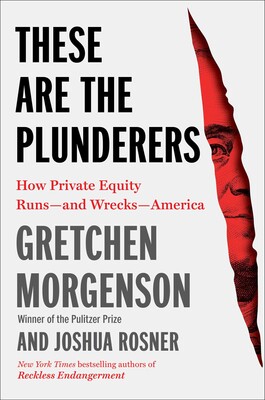
“The Pennsylvania [Public School Employees Retirement System] pension’s decision to keep investing with Apollo mirrored similar actions taken by public funds across the country. They throw their beneficiaries’ money into high-cost investments rewarding the very same plunderers who fire lower and middle-class workers and diminish government revenues through tax loopholes. As such, these pensions are among the chief contributors to the widening wealth gap in the US, a gulf that harms the very people the pensions are supposed to benefit.
This anomaly is even more puzzling when viewed against the findings in a 2020 pension study by academics at Harvard University and Stanford University. Analyzing $500 billion of investments in private equity funds by two hundred public pensions between 1990 and 2018, the researchers found that excessive fees levied by the predators depleted some pensions’ returns by $45 billion, or almost 10 percent of the pie.”
~ These Are the Plunderers, pages 238-239
By Catherine Austin Fitts
Gretchen Morgenson is a former stock broker who is now the senior financial reporter for the NBC News Investigations Unit. Her co-author, Joshua Rosner, is a Wall Street veteran and managing director at Graham Fisher & Co. Together, they have written another blockbuster on private equity, published in 2023 in the same year as Brendan Ballou’s Plunder.
If you have time to read more than one book on the private equity industry, These Are the Plunderers is well worth your time. Well researched and written, it adds a wealth of excellent case studies, including several transactions by Apollo, a private equity firm started by Leon Black that grew out of the collapse of the junk bond group at Drexel Burnham when Michael Milken was indicted.
The best way to understand the private equity industry and its lead players is to read the histories of the deals. It is hard, important work to wade through legal documents and interviews to assemble these histories. Consequently, Morgenson and Rosner have done us a great service by researching and writing this book.
Combining These Are the Plunderers with Plunder and Ballou’s Part III policy recommendations makes for a powerful one-two punch. The combination also makes it impossible to dismiss one author or one set of case studies. Reading these two books together brings the message home—America has a serious problem, and our survival as a Constitutional republic requires that we face and address it.
The large private equity firms are looking forward to new rounds of plunder in America over the coming decade. These operations are critical on the road toward implementation of “It’s 2030 and you have no assets.” Let’s hope that with the wealth of documentation that Morgenson, Rosner, and Ballou have provided, we can begin to cut off the special tax treatment and secrecy that gives private equity so many special privileges and encourages our pension fund and retirement savings to continue financing their pirate plunder despite the havoc they create.
The multipolar world is emerging, filled with economies and companies that compete by applying real technology and making real things. While the U.S. economy is making lots of billionaires, it is also making too many planes that crash, too many drugs that poison children and addict their parents, and too many retail companies that practice financial fraud as a business model.
It’s time for a change, converting the rich returns of subsidized billionaire plunder to the rich returns of economic productivity.
Purchase the book here.
Related Solari Report Resources:
Dillon Read & Co. Inc. & the Aristocracy of Stock Profits
An Editorial Comment on Private Equity
Book Review: Plunder: Private Equity’s Plan to Pillage America by Brendan Ballou
